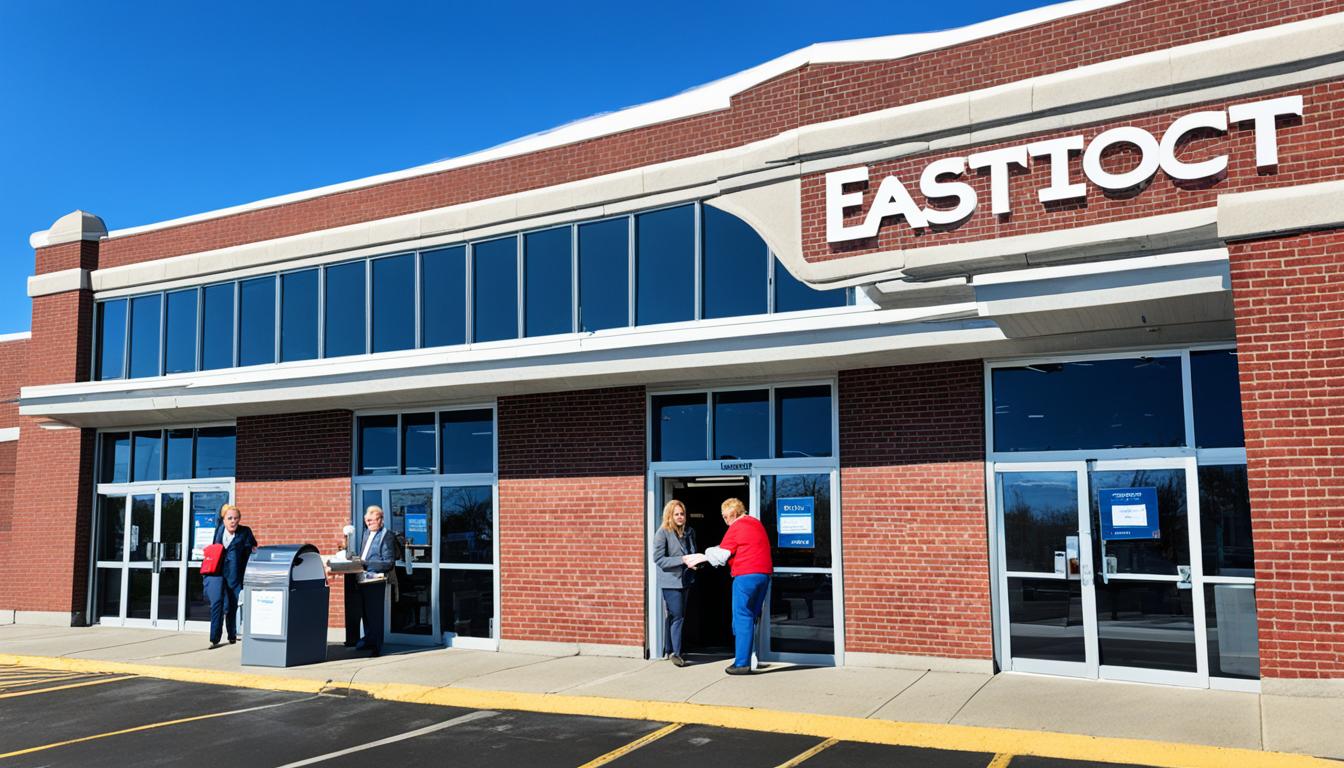You can typically visit your county clerk office Monday through Friday, with hours usually from 8:00 AM to 4:30 PM, but these vary by location. Many offices offer walk-in support, phone assistance, and even extended or after-hours appointments to help fit your schedule. They provide accessible facilities and accommodations upon request. To learn about specific hours, services, and how to prepare your documents, keep exploring for detailed guidance.
Key Takeaways
- Office hours vary by location, typically from 8:00 AM to 4:30 PM, Monday through Friday.
- Check specific county clerk office hours online or by phone before visiting.
- Some offices offer extended hours or after-hours appointments for filing vital documents.
- Public holidays may affect office availability and operating hours.
- Confirm parking options and security protocols prior to your visit for a smooth experience.
Typical Office Hours and Availability

Most county clerk offices operate weekdays from Monday to Friday, but their hours can vary depending on the location. Be aware of office holidays, which may close the office entirely or shorten hours around federal and state holidays. It’s wise to check the specific hours before visiting. Parking facilities are usually available nearby, but availability can differ; some offices offer designated parking, while others rely on public parking options. During busy times, parking may fill up quickly, so arriving early can save you time. Many offices also provide extended hours on certain days or by appointment, but standard hours typically run from 8:00 AM to 4:30 PM. Always verify hours and parking options to guarantee a smooth visit, especially if you’re planning to handle essential records or legal documents. Effective wall organization can also help create a more efficient and welcoming environment during your visit.
Walk-In and Phone Support Services
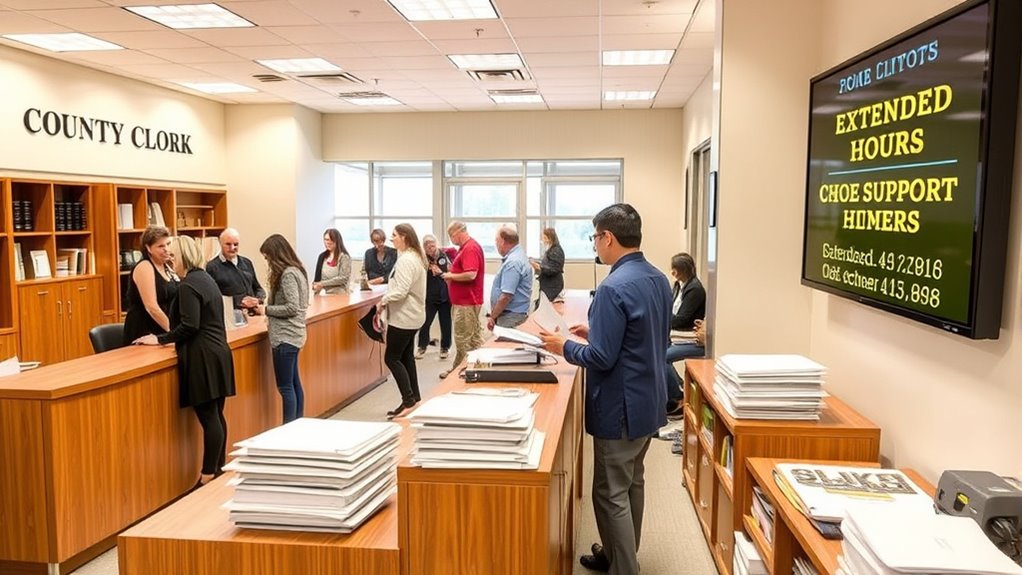
Walk-in and phone support services are essential ways to access county clerk offices quickly and conveniently. When you visit in person, expect security protocols such as ID checks and bag scans to protect sensitive records. Parking arrangements vary; some offices offer designated spots, while others advise nearby public parking. Calling ahead helps you confirm office hours and whether your documents are ready, saving you time. Support staff are trained to assist with application procedures, answer questions about fees, and provide guidance on required documents. Be prepared to follow security protocols during your visit, which helps keep everyone safe. Detecting passive voice can improve the clarity and impact of your writing. If you prefer, phone support allows you to get quick information without leaving home, ensuring you’re well-informed before your visit.
Extended Hours and Special Accommodations
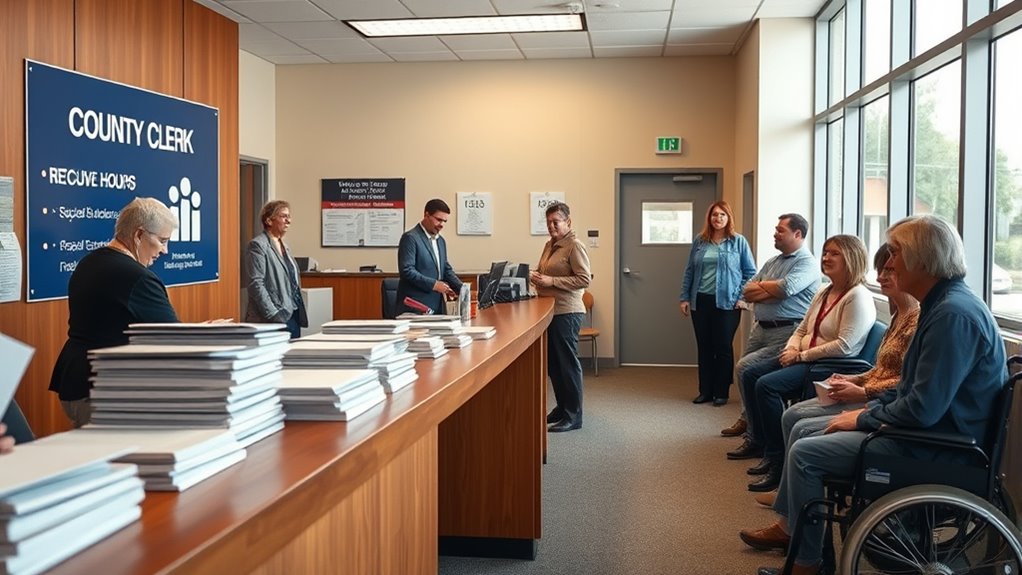
Many offices now offer after-hours appointment options to fit your busy schedule. Accessible facilities are available to guarantee everyone can receive services comfortably. If you have specific needs, you can request special accommodations to make your visit easier.
After-Hours Appointment Options
If you need to access county clerk services outside regular hours, some offices offer extended appointment options or special accommodations. These include late-night appointments for urgent needs like emergency document retrieval, ensuring you can get essential records when time is critical. To help you understand your options, here’s a quick overview:
| Service Type | Availability | Requirements |
|---|---|---|
| Extended Hours | Evenings and weekends | Appointment required |
| Special Accommodations | Disability or language needs | Prior request needed |
| Late Night Appointments | After-hours for urgent cases | Emergency reason documentation |
| Emergency Retrieval | Immediate access during off-hours | Proof of urgency |
Check with your local office to confirm availability and book your appointment in advance. Creativity can be cultivated through consistent practice and attention, making it easier to adapt and find solutions even under limits or constraints.
Accessible Facilities for All
To guarantee everyone can access county clerk services regardless of their schedule or physical abilities, offices now offer extended hours and special accommodations. You’ll find assistive technology, such as screen readers and magnifiers, to help those with visual impairments. Wheelchair accessibility is prioritized, with ramps, wide doorways, and accessible counters making it easier to navigate the office. If you need extended hours, you can request them in advance, ensuring you don’t miss out on essential services. Staff are trained to assist with accommodations, helping you complete your tasks smoothly. These measures aim to make essential document filing and other services inclusive for all community members, regardless of physical limitations or busy schedules. Additionally, understanding accessible facilities and services can help you better navigate the available resources.
Special Accommodation Requests
You can request special accommodations, including extended hours and accessible services, to guarantee you receive county clerk assistance when it fits your schedule. If regular hours don’t work, ask about extended hours or remote assistance options. Many offices offer remote assistance to help you complete your requests without visiting in person. If you need interpreter services, notify the office in advance so they can arrange for qualified interpreters to assist you during your visit or via remote communication. These accommodations ensure you can access essential records and filing services comfortably and efficiently. By requesting these services ahead of time, you help streamline your visit and ensure all your needs are met, no matter your schedule or circumstances. Promoting independence and dignity are central to providing personalized services that accommodate individual needs.
Vital Records Access and Eligibility Criteria
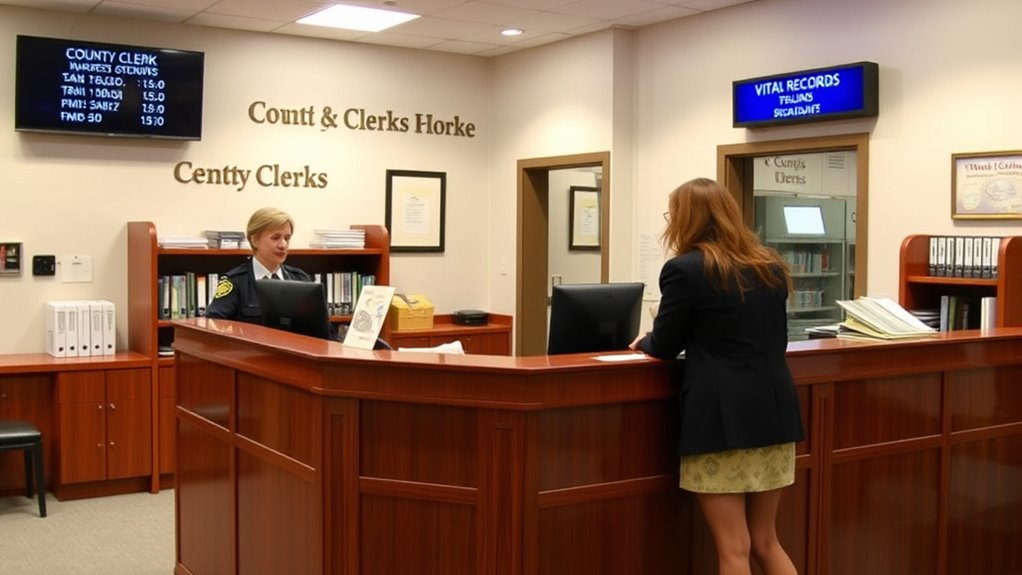
You can access essential records only if you meet specific eligibility criteria, such as being an immediate family member or having proper authorization. Restrictions vary depending on the type of record and how long it was issued. If you’re not a family member, you’ll need a notarized Power of Attorney to obtain these records. Additionally, some records may involve dog breed information that can assist in verifying pet-related documents.
Access Restrictions for Records
Who can access essential records, and what restrictions apply? Access to crucial records is limited to ensure record confidentiality and comply with public access restrictions. Generally, only immediate family members or authorized individuals can request birth, death, marriage, or divorce records. Non-family members must provide notarized Power of Attorney to gain access. After certain periods—100 years for birth records and 25 years for others—public access restrictions loosen, allowing broader public viewing. Even then, some records remain restricted to protect privacy. Valid ID is required for all requests. These restrictions safeguard personal information and uphold privacy laws. If you’re not eligible, you’ll need proper authorization or legal proof to access certain records. Understanding the public access restrictions helps ensure you follow proper procedures when requesting vital documents.
Family Member Eligibility Rules
Access to essential records is primarily limited to immediate family members and authorized individuals to protect privacy. If you have custody rights or are involved in adoption procedures, you may qualify to access certain vital records. Usually, parents, spouses, children, siblings, grandparents, and adult grandchildren are eligible under these rules. Adoption records often require legal authorization or proof of relationship. In cases involving custody rights, the court’s approval may be necessary to access records for minors or contested cases. If you’re not a direct family member but need access, you’ll typically need a notarized Power of Attorney and valid ID. Restrictions help ensure sensitive information remains confidential, and eligibility is strictly enforced to safeguard personal privacy. Additionally, privacy policies outline how access to records is managed to protect individual data.
Non-Family Access Requirements
Wondering how non-family members can obtain essential records? You must meet specific non-family access requirements, typically involving notarized Power of Attorney and valid ID. Notary requirements guarantee the authenticity of your authority to request records on someone’s behalf. Record confidentiality remains a priority, restricting access to protect sensitive information. Understanding market research can help you navigate these requirements more effectively.
Procedures for Filing and Requesting Documents

Filing and requesting documents at the county clerk’s office involves a straightforward process, but knowing the specific steps can save you time. First, gather all required documents, such as IDs and completed forms. If you’re eligible, ask about fee waivers to reduce costs. When submitting vital records, you may need document notarization if you’re acting on behalf of someone else or using a Power of Attorney. Visit the office during business hours or use online or mail-in options for convenience. Confirm your application includes the correct fees, usually around $12 per copy, paid by check, money order, or other accepted methods. Verify your request details beforehand, and follow instructions for submitting or requesting pick-up. Clear communication streamlines the process and reduces delays. Additionally, understanding the effectiveness of eye patches can help in making informed decisions about their use in personal care routines.
Online and Mail-In Application Options
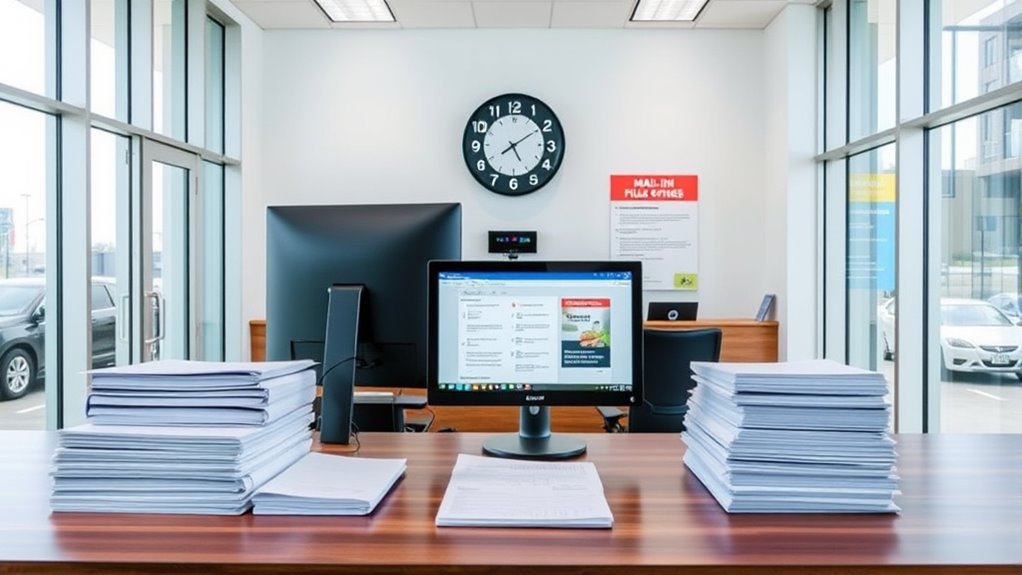
You can conveniently apply for essential records through online and mail-in options without visiting the office in person. The online system allows you to securely submit applications and make payments, using digital verification to confirm your identity. This method streamlines the process and saves you time. When applying online, privacy safeguards are in place to protect your personal information, ensuring that your data remains confidential. Alternatively, you can send your application via mail, including all required documents and payment. Both options provide a safe and efficient way to obtain crucial records, especially if you cannot visit during office hours. These methods are designed to simplify your experience while maintaining strict privacy standards.
Role of Circuit Courts in Document Processing
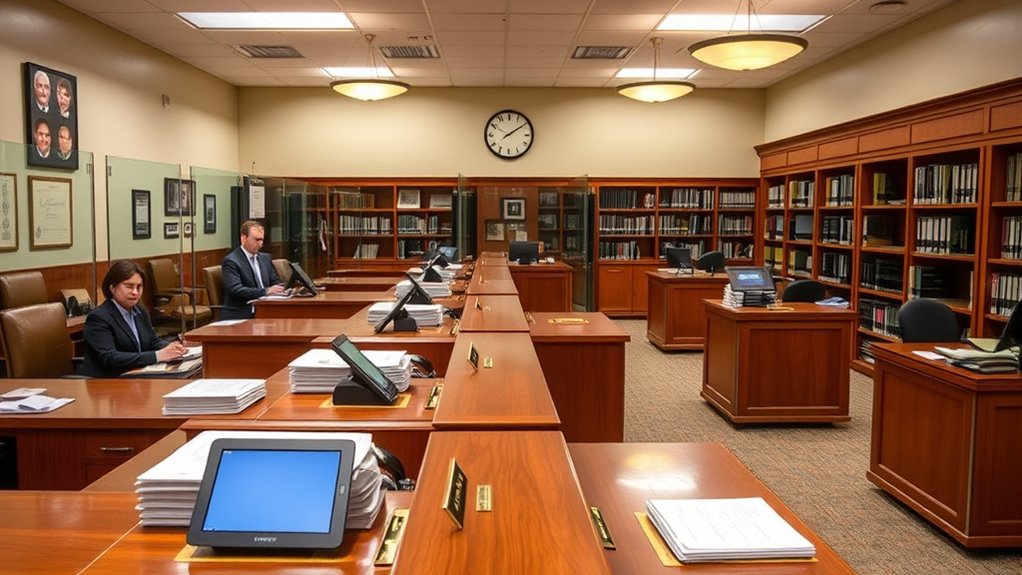
Circuit courts play a crucial role in processing legal and essential records, such as marriage licenses and divorce documents. Your court jurisdiction determines which cases they handle, guaranteeing records are managed properly within their legal scope. When you submit documents, the court follows specific legal procedures to verify, record, and store vital information. They issue marriage licenses and maintain divorce records according to state laws. The courts also oversee the validity and authenticity of these documents, making sure all procedures are correctly followed. If you need to access or update legal records, the circuit court’s role is vital in maintaining accuracy and legal compliance. Their responsibilities ensure that vital records are processed efficiently, securely, and in accordance with the law.
Frequently Asked Questions
How Long Does It Typically Take to Process Vital Record Requests?
Processing times for crucial record requests vary depending on the record type and request method. Typically, if you apply online or in person, it takes about 3 to 7 business days. Mail-in requests may take longer, around 2 to 4 weeks. To guarantee smooth record request procedures, provide all required documentation and payment promptly. You can also check with the office for specific processing times and options for expedited service.
Are Same-Day Appointments Available for Filing Documents?
Yes, same-day appointments are often available for filing essential documents. You should check the specific office’s appointment scheduling options online or call ahead, as availability varies by location. Make certain you meet the document requirements, such as valid ID and completed forms, to guarantee smooth processing. Arriving early and confirming your appointment can help you avoid delays. Keep in mind that walk-in services might be limited during busy times.
Can I Expedite the Processing of My Vital Records?
Yes, you can expedite the processing of your essential records for urgent requests. Many offices offer expedited processing options, but you’ll need to request this when you apply and pay an additional fee. Make sure to clearly indicate your urgency and provide all required documentation. Contact the office beforehand to confirm availability and specific procedures, so your request is handled promptly and efficiently.
What Identification Is Acceptable for Record Verification?
Imagine you’re at the county office, needing to verify your identity for a essential record. You’ll need a valid photo ID, like a driver’s license or passport, to prove who you are. Acceptable documents include government-issued IDs, state IDs, or military IDs. Make sure your photo ID is current and valid, as it’s the primary form of record verification, ensuring a smooth and quick process.
Are There Bilingual Staff or Translation Services Available?
Yes, many offices offer bilingual assistance and translation services to help you access essential records more easily. You can request translation support when visiting or calling the office, and some locations have staff fluent in common languages. If you need specialized translation services, it’s best to contact the office in advance to guarantee they can accommodate your needs. This way, you get smooth communication and quicker access to your vital documents.
Conclusion
Steering the county clerk’s office is like charting a course through a well-lit map, where hours and support serve as your guiding stars. With online options and clear procedures, you hold the compass to your essential records journey. Whether walking in or mailing requests, you’re steering your own ship through the administrative waters. Stay informed and prepared, and you’ll sail smoothly toward securing the documents you need, anchored by knowledge and accessible services.


